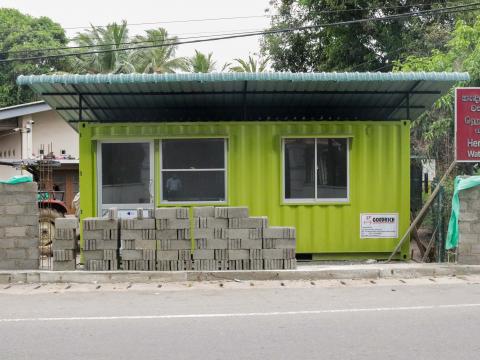World Vision provides livelihood intervention through eco-friendly waste disposal

12 August 2020, COLOMBO - World Vision Lanka recently handed over “ReSource Banks” or ‘Sampath Piyasa’ to the local authorities in Wattala, Ja-Ela and Chavakachcheri areas in a bid to provide livelihood opportunities for 500 households by helping them incorporate environmentally friendly solutions for waste disposal. The “ReSource Banks” function as resource recovery centres, providing a place for the families to segregate and drop off their non-biodegradable and clean waste and earn rewards on the type and amount of waste given.
This initiative is a part of the PHINLA Project (a global programme focused on waste management systems), which is funded by the German government and implemented by World Vision Lanka in partnership with Sevanatha Urban Resource Centre.
The waste brought to the centre will be weighed and pre-agreed points will be allocated once 1000 points are reached. When the individual reaches 1000 points, he/she will be made eligible to redeem them for 1000 rupees or other alternative rewarding plans equal to the earned value will be provided. The center operators will facilitate value additions through further segregation, further cleaning, storing, baling etc. to make this purchasable for recycling companies.
“Even though the central Government has been working with the provincial councils we are yet to find an efficient mechanism to rectify issues surrounding waste management. Therefore, I would like to extend my heartfelt gratitude for the immense support World Vision has been rendering to the Western province through the PHINLA Project to find ways to rectify this issue,” says Kasun Apasinghe, Commissioner of Local Governments and the Director of the Solid Waste Management Authority of the Western Province.
“Since the government has made it compulsory for waster segregation at the household level, I greatly appreciate how the ReSource Bank will work with the community in managing the waste. I want to assure our fullest support on the part of the government for this initiative," he said.
Speaking at the event, Deputy Ambassador of Germany to Sri Lanka, Andreas Berg said, “We are all only aware of the need for good and effective waste management systems. These systems need to be established as a collaboration with the community who understand that their contribution such as segregation at source, is the first step in creating a cleaner environment that is sustainable. Another factor that is extremely difficult and maybe even controversial is the disposal of solid waste in urban areas and indeed rural areas. I sincerely hope that this very important initiative by World Vision and Sevanatha Urban Resource Centre bears fruit and this initiative is scaled up to include more locations where the solid waste management is a massive problem which needs speedy solutions”.

The PHINLA Project also plans to bring about behavioural change among people by helping them move from the habits of bad management of household waste to practising resource recovery methods of waste management. This project will also assist the recycling industry with insight and ideas relating to waste management and contribute to circular economic principals.
“With safeguarding the environment being one of the cross-cutting themes at World Vision, we believe the tools provided through this programme can improve waste management methods ensuring sustainable development, especially among urban dwellers. We are looking to encourage waste management by incentivizing this method among the most vulnerable people so that they can earn a living by incorporating best practices. We are glad that we are able to provide these
tools through our partnership with the relevant local government bodies, the German government and the Sevanatha Urban Resource Centre to carry out this project”, added the National Director of World Vision Lanka, Dr Dhanan Senathirajah.
This project will be in effect until 2022.
World Vision is a development and advocacy organization and works in 34 locations in 16 Districts across Sri Lanka directly impacting nearly 100,000 assisting children and their families.